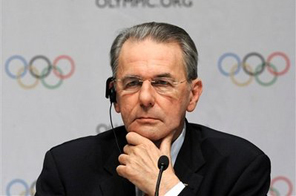Jacques Rogge re-elected as IOC president
COPENHAGEN: Jacques Rogge easily won re-election as president of the International Olympic Committee on Friday for a final four-year term.
The 67-year-old Belgian, who has served as IOC president since 2001, was the only candidate and needed a simple majority in the vote. The IOC voted 88-1 in favor of his re-election. Three members abstained from voting.
"You have given me a great honor. We have accomplished a lot together," Rogge said. "Our focus now is on the future. We have a lot of work to do."
Brazilian IOC member Joao Havelange asked that the vote be done simply by acclamation, but Rogge insisted on a secret ballot.
Also, the Olympic body elected two new vice presidents and two new executive board members, re-elected its current assembly and accepted six new IOC members.
Mario Pescante of Italy and Ser Miang Ng of Singapore were named vice presidents, beating out two other candidates — C.K. Wu of Taiwan and Samih Moudallal of Syria.
Craig Reedie of Britain and John Coates of Australia were elected to the executive board. Reedie's election was important for Britain to have a member on the ruling body going into the 2012 London Olympics. Moudallal, Wu and Patrick Hickey of Ireland also ran for the posts.
Danish Crown Prince Frederik headlined the list of new IOC members, which also included Richard Peterkin of St. Lucia, Habu Ahmed Gumel of Nigeria, Habib Abdul Nabi Macki of Oman, Lydia Nsekera of Burundi and Goran Petersson of Sweden.
They were the only six candidates for membership.
That brings the total number of IOC members to 112. Three of those, Walther Troeger of Germany, Tamas Ajan of Hungary and Zhenliang He of China, are leaving at the end of the year.
The IOC was to vote later Friday on whether to include golf and rugby as new sports for the 2016 Rio de Janeiro Games.
Rogge was elected the IOC's eighth president in July 2001, defeating three other candidates and taking over from Juan Antonio Samaranch after 21 years in power.
Rogge has overseen successful Summer Olympics in Athens (2004) and Beijing (2008) and Winter Games in Salt Lake City (2002) and Turin, Italy (2006). The former orthopedic surgeon made the fight against doping his top priority in his first eight-year term, and pledged to continue the efforts to stop cheaters over the next four years.
He has also championed the creation of the Youth Olympic Games, which will debut in Singapore next year featuring athletes aged 14-18.
"We will be staunch allies of the athletes," he said. "We will narrow the gap in sports between the developed and developing worlds, and between men and women."






